Climate change is not a future event. It is happening now,
and it’s impacting communities globally
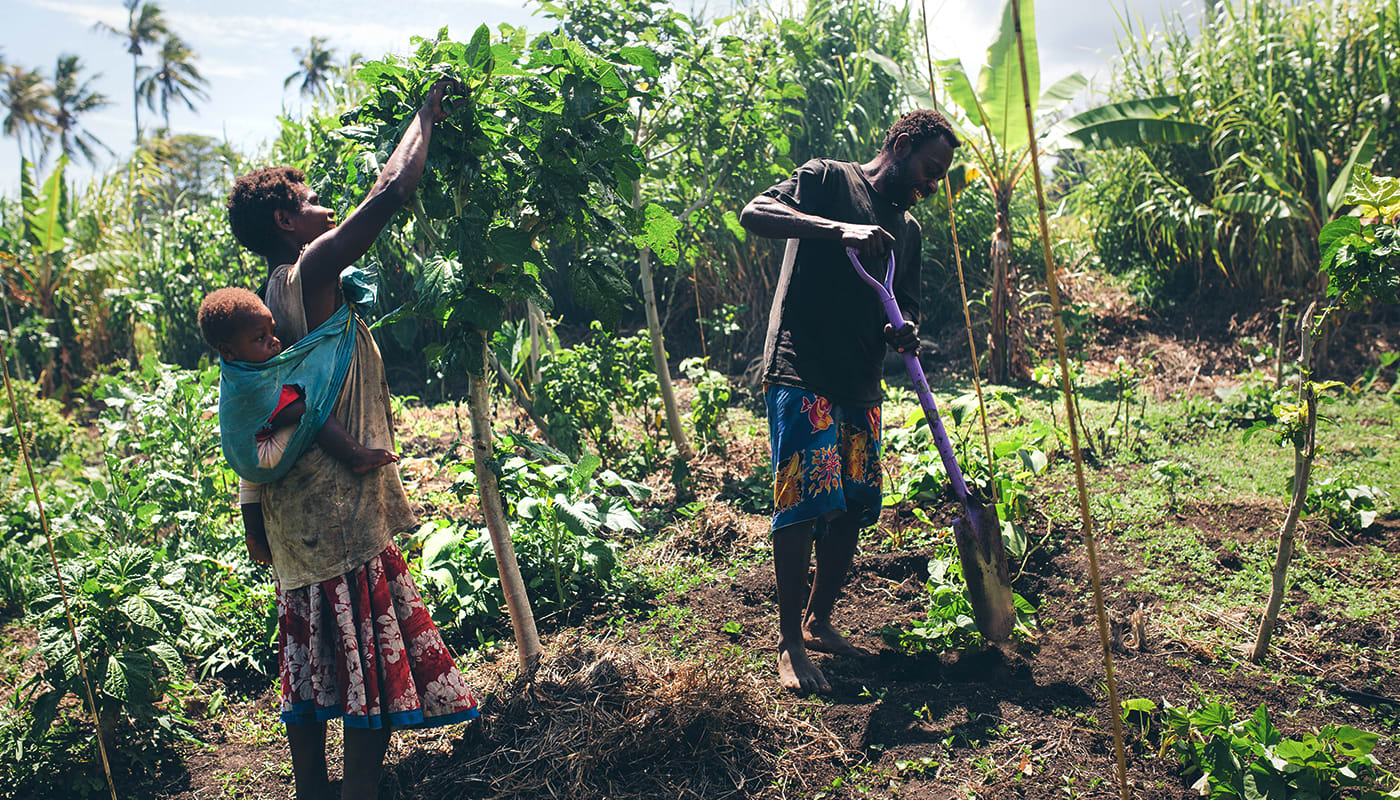
Climate change and extreme weather events are reversing the hard-won gains in child well-being from the previous decades. Sudden disasters and slower, incremental destruction can impede children’s rights to a healthy environment and to live in a way that helps them reach their full physical, mental, spiritual, and social potential.
We are partnering with communities to help them adapt to changing weather patterns, restore ecosystems, reduce their impact on the environment, and to build resilience to hazards that impact their homes, water supply and livelihoods.
We are also advocating with governments for equitable climate action and strengthening the autonomy and participation of women, children, and people with disabilities who are disproportionately impacted by the climate crisis.
Donate now
Restoring ecosystems
Alongside farmers and communities, we work to protect and restore land, vegetation and water supplies to ensure sustainable improvements in ecosystems. Projects typically focus on smallholder farmers working in semi-arid areas, where declining household income and food insecurity place children’s well-being at risk.

Building resilience
We’re working with communities to help build resilience to extreme weather events, ensuring families have adequate incomes so they can recover more quickly when disaster strikes. We work with communities to help identify risks and develop plans to help prepare for emergencies.
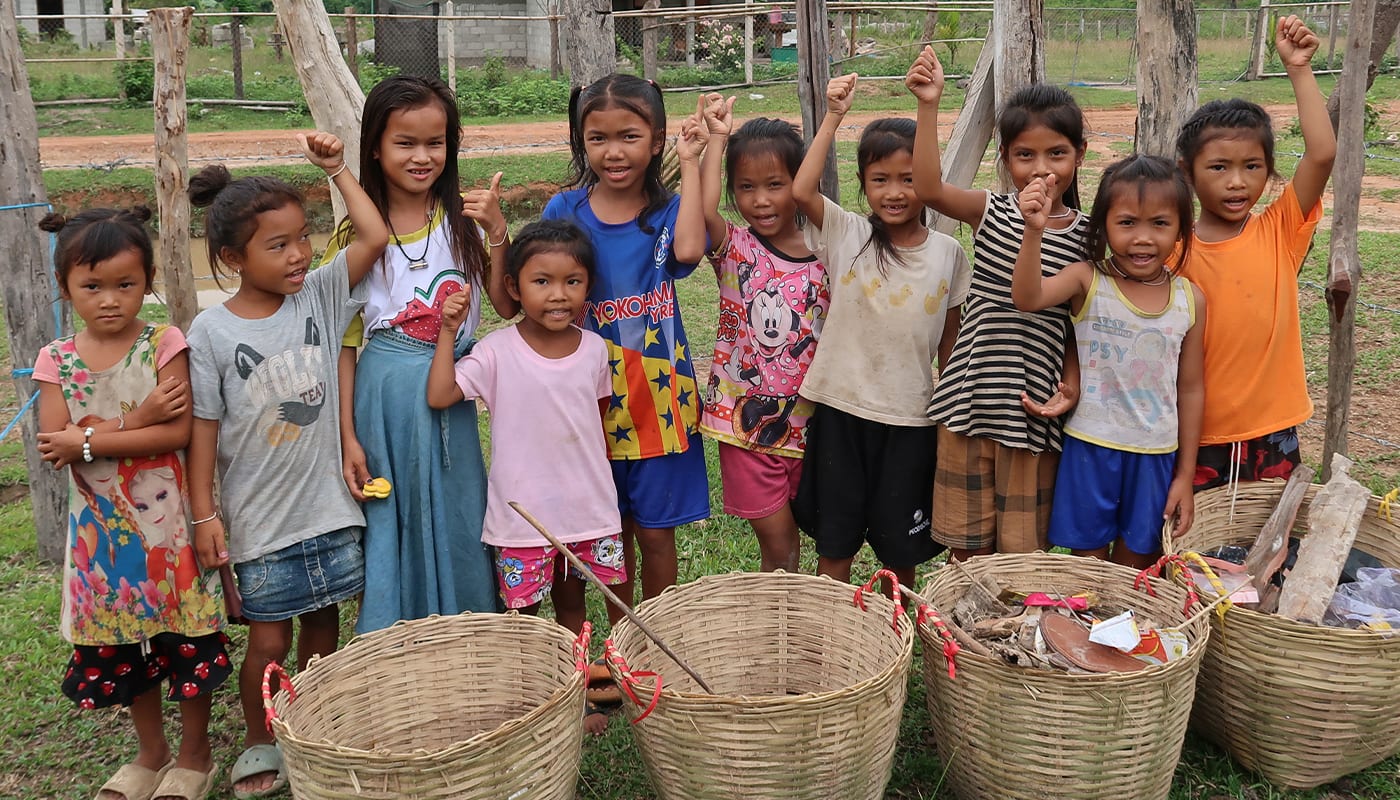
Supporting climate advocates
We upskill children and their communities about engaging in climate action. They learn how to raise their voice effectively through education, training, awareness-raising, participation, public access to information and international cooperation on these issues.
“I am grateful to World Vision,” says Benedict. “They have trained us on how we can help our homes, community, families and selves."
Benedict and his grandson, Papua New Guinea
We partner with communities around the world to revitalise degraded land
Take action today
Give a meaningful gift that will change lives and create stronger, healthier communities.
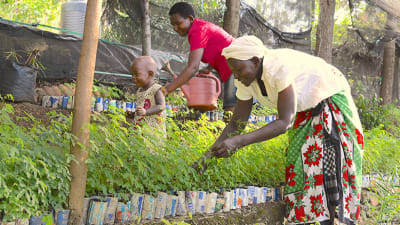
$18 to buy tree seedlings
This gift will help farming families regenerate their land and grow more food. Plus, you’ll tap into tackling climate change caused by greenhouse gas.
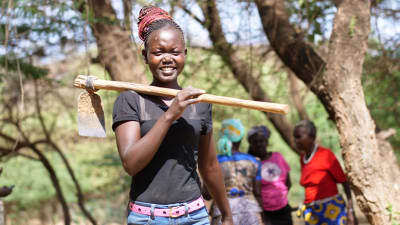
$215 to help revive a forest
This gift will fight climate change and help revive a piece of forest almost as big as a soccer field. Even if all the trees have been chopped down. It’s almost unbeleafable!
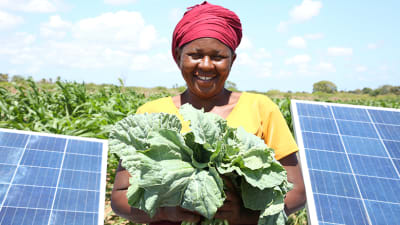
$1,225 to fund farming
This gift will equip a farmer with the skills and tools to manage their crops in the face of a changing climate. Think drought-resistant seeds, bumper harvests and better family income.

$28 to fund a family vege garden
Families will receive the seeds, tools and training they need to put food on the table and sell quality produce. That’s two (green) thumbs up for sowing health into kids and families.
FAQs
The Intergovernmental Panel on Climate Change (IPCC), the leading scientific forum for climate analysis, tells us that planet earth is currently warming in a historically unprecedented manner. While there are multiple complex drivers, it is primarily human activities, particularly agriculture, the burning of fossil fuels (coal, oil and gas), and the destruction of forests. These activities produce greenhouse gases, which collect in the atmosphere and, like a blanket, warm the surface of the earth. They are now at their highest levels in history.
Communities around the world are already feeling the impacts of climate change. Rising greenhouse gas levels are driving more frequent and intense storms, changes in rainfall patterns, increasing air and ocean temperatures, melting ice sheets and glaciers, and rising sea levels. These changes then go on to affect soil fertility, water availability, and ultimately the well-being of people and our environments.
People experiencing poverty are on the frontlines of climate change, being among the first and worst impacted by environmental degradation. Temperature and weather extremes are hitting hardest in places where food and water are already limited, like in sub-Saharan Africa and low-lying countries in the Pacific. What’s more, people living in poverty often have limited resources for adapting to climate-related hazards, such as insurance, a warm, dry home, and a full pantry. This means that communities are less able to bounce back when disaster strikes.
For children in poverty, climate change makes life even harder and more dangerous. Children are less able to protect themselves from extreme weather events and are more susceptible to disease, famine and drought. Families may need to migrate elsewhere, take their children out of school, and/or get them to help at home. In some cases, families must resort to child marriage or child labour just to survive. Children often do not get to have a say in such decisions, which can lead to situations that make them more vulnerable to climate change.
Our Pacific partners have shared stories with us about failing crops as the soil becomes too salty, islands where they grew up slowly eroding away, and sudden and severe cyclones uprooting their families’ graves. People don’t want to move to other countries and see climate migration as a last resort. However, some communities must already relocate their homes further inland to protect their lives and livelihoods.
Future generations of Pacific children are particularly at risk of harm from these environmental changes. Pacific children are at greatest risk of the impacts of climate change on food supply. Malnutrition, diarrhoeal disease and malaria will likely increase because of climate change.
On top of this, relocating or migrating elsewhere disrupts children’s connections to their identities. Being connected to their ancestral lands is important for children’s cultural and spiritual well-being. However, some low-lying countries and islands are at risk of disappearing completely due to rising sea levels. If they do have to leave, community elders are worried that their grandchildren will lose touch with their identity, language and cultural heritage, which are treasures to protect.
- An example is Chauk community, which lies in the ‘dry zone’ of Myanmar and is prone to fires and flooding. Disaster Preparedness Plans have been established in 19 communities to improve their preparedness and resilience, including through an early warning system and the establishment of freshwater tanks.
- World Vision is working with farmers in Timor-Leste to restore previously unusable land, to increase resilience to climate-induced shocks. Communities used to employ a ‘slash and burn’ practice to maintain soil fertility, meaning they would indiscriminately burn wood from the forest. As a consequence, soil quality has been degraded and forest cover reduced. With the support of World Vision’s Farmer Managed Natural Regeneration (FMNR) programme, farmer groups are now learning how to regenerate trees and shrubs from the ‘underground forest’ of living tree stumps and roots, breathing life back into original land cover.
- In Ethiopia, a trial run by World Vision saw 2,500 fuel-efficient and environmentally friendly stoves distributed to a community. Local women were chosen to participate in the project and trained in how to make the stoves and run their own businesses. The evaluation showed the stoves reduced the amount of carbon monoxide released during cooking by up to 53%, and that the amount of firewood needed was reduced by up to 49%. Community members said they also noticed a dramatic reduction in the time spent collecting firewood and their children missed less school.
- In Senetwo, Kenya, World Vision is implementing its FMNR programme alongside local farmers. Senetwo is prone to drought due to the impacts of climate change, the impacts of which are worse for people living with disabilities. Through FMNR, World Vision is training smallholder farmers and pastorialists with disabilities to regenerate living root systems on their lands to regrow them into mature trees, boosting soil fertility and soil moisture. Disabled farmers say that FMNR offers a sustainable solution to drought that allows them to better provide for their families during the dry season without needing to rely upon others.
We’ve already seen that droughts, cyclones and floods are more frequent, destroying homes and livelihoods. Seasons are less predictable and crops are failing, pushing millions into hunger. Sea levels are rising, forcing women, men and children to leave their homes and land.
The social and economic impacts of climate change are making it more difficult for people to enjoy their basic human rights, including those related to food, health, water, housing and adequate standard of living.
We are committed to helping communities prepare themselves for climate change. Our work is focused on building communities’ resilience to the effects of climate change, for example through disaster preparedness planning and improving food and water security measures. We are also working to increase environment-enhancing development activities such as reforestation, agro-forestry, and conservation farming in World Vision’s programmes.
World Vision further advocates with governments to reduce harmful greenhouse gas emissions and fulfil their climate-related commitments under the Paris Agreement as well as the Sustainable Development Goals.
In the Pacific Islands coastal infrastructure and land is being lost, there are more intense cyclones and droughts, crops and coastal fisheries that families rely on are being impacted, alongside coral reefs and mangroves that support the ecosystems on which families rely.
Climate change threatens the future generations of Pacific children. Because they are still growing, children are at greatest risk of the impacts of climate change on food supply. The greatest killers of children – malnutrition, diarrhoeal disease and malaria – will increase because of climate change.
A healthy environment is the basis for the future of children.
In these regions, climate change is threatening food security, agriculture, water supplies, economic stability and health, especially among children. For example, extreme weather events can spread diseases including diarrhoea, leptospirosis, cholera, and typhoid through exposure to contaminated water or decreased hygiene due to water shortages. These diseases have the potential to kill children.
On top of this, climate change is causing large scale displacement of people within countries and sometimes across country borders. This climate-related migration poses major health risks to those on the move. Without proper planning, migration can place people in dangerous and precarious living situations. Migrating also threatens communities’ connections with their lands, livelihoods, and cultural heritage.
These overlapping issues can be addressed directly through World Vision’s work. World Vision is working alongside communities, including in the Pacific, to strengthen their resilience to climate impacts so that they can remain in their homelands. The organisation is also partnering with women, children, and people with disabilities to strengthen their participation in decision-making and boost their disaster preparedness. At the same time, World Vision is taking actions that reduce harmful greenhouse gas emissions to avoid climate change’s most severe effects.